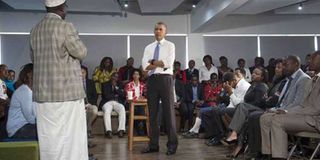Civil society still has role in our democracy

US President Barack Obama listens to a question during an event with representatives of civil society organisations in Nairobi on July 26, 2015. As Mr Obama alluded, the involvement of civil society groups, especially those championing good governance, is critical for the growth of Kenya’s democracy. PHOTO | SAUL LOEB | AFP
What you need to know:
- The opposition parties have demonstrated that they lack the capacity to hold the government accountable.
- Our nascent democracy cannot flourish without a strong opposition.
- A focused civil society can exert much-needed pressure on the government to deliver on its promises.
Although civil society has in recent years lost much of its energy as a champion of good governance, the renewed interest by the US government in the country’s non-governmental actors is a good beginning point for their re-invention.
President Obama spoke passionately about civil society and went ahead to meet a section of its representatives.
However, it was clear that civil society in the country is today a shadow of what it was in the 1990s, when it strongly advocated multiparty democracy and chartered the path of the two-decade journey to the new Constitution.
Apart from presenting grievances to Mr Obama, who has over the years shown significant support for civic space, it was clear that the non-governmental organisations do not have a clear agenda on how to confront government excesses.
Doubtless, as Mr Obama alluded, the involvement of civil society groups, especially those championing good governance, is critical for the growth of Kenya’s democracy.
The opposition parties have demonstrated that they lack the capacity to hold the government accountable.
Unlike in the early 1990s, when opposition parties worked closely with churches and human rights and good governance NGOs, things are now different.
While President Obama applauded Mr Uhuru Kenyatta’s regime for good governance and economic prosperity, he also emphasised the need for a strong civil society.
This was a good gesture from the president of a country that has for years been a major financier of a civil society that is now struggling for relevance.
Our nascent democracy cannot flourish without a strong opposition.
As we wait for the opposition parties to get their act together, civil society must step up its game and bring back the vibrancy that can give the country a constructive political debate.
Although the Church has been accused of taking a partisan political position on several occasions, it still commands respect among Kenyans, enough to offer a proper entry point for engagement.
FOCUSED AND FEARLESS
A focused and fearless leadership ready to make sacrifices for this nation has been lacking in civil society since its leading lights either joined the government, lost interest, or went into consultancy.
Some of the names that gave civil society credence include Dr Willy Mutunga, Prof Kivutha Kibwana, Prof Wangari Maathai, Mr Kiraitu Murungi, and Mr Gitobu Imanyara.
A focused civil society can exert much-needed pressure on the government to deliver on its promises.
The government’s attempts to shrink democratic space and annihilate civil society have met little opposition.
Kenya’s civil society must understand that its role is not to oppose the government; it is to be a voice of reason — criticise the government when it must and compliment it when necessary.
Since 2002, funding to civil society has dwindled as donors prefer to support government programmes.
However, there are various programmes that can be effectively implemented through a strong relationship between the government and community-based organisations.
In some areas such as the northeastern region, which faces immense terrorist threats, collaboration with local communities, through community based organisations, is a good strategy to reduce the risk.
Mr Obonyo is a Global Young Diplomat and external adviser on the UN Habitat’s Youth Advisory Board. [email protected]





